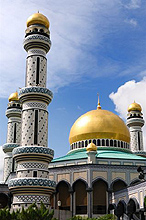Where Is Brunei and What
Is It Known For?

Mosque in Brunei
|
Brunei, officially the State of Brunei Darussalam, is a sovereign state that lies on the northwest coast of the island of Borneo, in Southeast Asian. Apart from its coastline with the South China Sea, it is completely surrounded by the state of Sarawak, Malaysia, and in fact it is separated into two parts by Limbang, which is part of Sarawak. It is the only sovereign state completely on the island of Borneo, with the remainder of the island belonging to Malaysia and Indonesia.
Brunei can trace its beginnings to the 7th century, when it was a subject state of the Srivijayan empire under the name Po-ni. It later became a vassal state of Majapahit before falling to Islam in the 15th century. At the peak of its empire, the sultanate had control that extended over the coastal regions of modern-day Sarawak and Sabah, the Sulu archipelago, and the islands off the northwest tip of Borneo. The thalassocracy was visited by Ferdinand Magellan in 1521 and fought the Castille War in 1578 against Spain. Its empire began to decline with the forced ceding of Sarawak to James Brooke and the ceding of Sabah to the British North Borneo Chartered Company. After the loss of Limbang, Brunei finally became a British protectorate in 1888, receiving a resident in 1906. In the post-occupation years, it formalised a constitution and fought an armed rebellion. Brunei regained its independence from the United Kingdom on 1 January 1984. Economic growth during the 1970s and 1990s, averaging 56 percent from 1999 to 2008, has transformed Brunei Darussalam into a newly industrialised country.
Tropical rainforest covers over two-thirds of the oil-rich state. You won't really encounter any drastic changes in temperature throughout the year. The maximum mean temperature is about 32.1 C while the minimum is about 23.8 C. Humidity is high throughout the year, thanks to the high temperature and rainfall.
The economy is dominated by the oil and gas industries. Brunei is the third-largest oil producer in Southeast Asia, averaging about 175,000 barrels a day in 2008. It also is the ninth-largest exporter of liquefied natural gas in the world. Like many oil producing countries, Brunei's economy has followed the swings of the world oil market. Economic growth has averaged around 2.8% in the 2000s, heavily dependent on oil and gas production. Overall oil production has declined in recent years, and growth rates have fallen significantly. Bruneiís oil reserves are expected to last 25 years, and natural gas reserves 40 years.
|